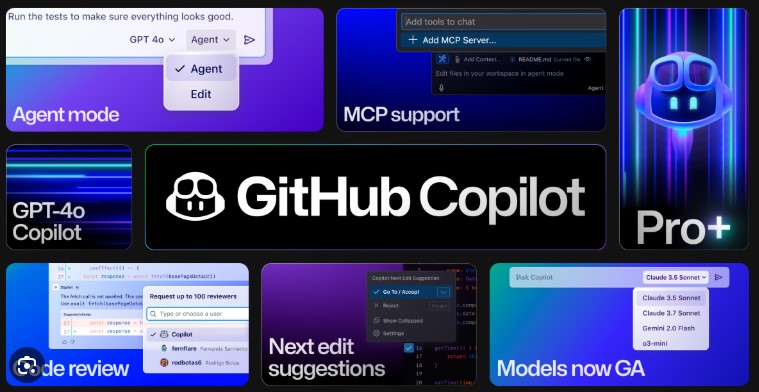
Microsoft Build 2025 Unveils AI Agents for Developers
Microsoft Build 2025 has made headlines with groundbreaking announcements focused on the evolution of AI agents. Held virtually and led by CEO Satya Nadella, the annual developer conference showcased Microsoft’s vision of an “open agentic web,” where intelligent AI agents can independently complete tasks and collaborate across domains. From transforming GitHub Copilot into a full-fledged coding assistant to unveiling multi-agent orchestration, Microsoft’s latest strides are set to redefine how developers build, businesses operate, and innovation unfolds.

GitHub Copilot Becomes a True AI Coding Agent
One of the most talked-about announcements was the transformation of GitHub Copilot into a complete AI agent. No longer limited to code suggestions, the new GitHub Copilot can now autonomously tackle real development tasks—bug fixes, feature additions, and code refactoring. It accomplishes these by engaging with GitHub issues and responding in Copilot Chat within Visual Studio Code.
Table of Contents
ToggleIn essence, GitHub Copilot now works more like a junior developer. It securely clones repositories, reads and understands codebases, and even drafts pull requests—all while logging its sessions for transparency. This leap marks a new era in AI-driven programming, allowing developers to offload repetitive or time-consuming tasks and focus on creative problem-solving.

Copilot Tuning: Custom AI Without Coding
Another standout update is Copilot Tuning, a low-code platform that lets organizations fine-tune AI models using their own data and workflows. Whether it’s a legal firm, healthcare provider, or logistics company, businesses can now develop customized AI agents tailored to specific operational needs—without writing a single line of code.
This democratizes AI access for non-developers and expands AI’s utility across a range of industries. With Copilot Tuning, Microsoft has made clear that the future of AI isn’t just for developers—it’s for everyone.

Multi-Agent Orchestration: AI Agents That Collaborate
Taking AI teamwork to the next level, multi-agent orchestration enables various AI agents to collaborate on end-to-end workflows. Imagine an onboarding process where AI agents from IT, HR, and Marketing coordinate efforts in real time—sending welcome emails, provisioning access, and scheduling training sessions—all autonomously.
This is Microsoft’s “open agentic web” in action: interconnected AI systems working across business domains, handling complex tasks without human micromanagement.

Azure AI Foundry Gets Supercharged
Microsoft also expanded the capabilities of Azure AI Foundry, its platform for building enterprise-grade AI applications. The Foundry now supports over 10,000 AI models, including the new Grok 3 and Grok 3 Mini, and offers seamless integrations with platforms like Hugging Face and Meta.
Importantly, these upgrades extend enterprise security and management features to AI agents, ensuring responsible usage in corporate environments. Developers and data scientists can now confidently deploy AI agents in industries such as finance, healthcare, and government.
NLWeb: Natural Language for Every Website
Further embracing the agentic future, Microsoft introduced NLWeb, an open-source tool that allows developers to embed natural language AI interfaces on any website with minimal code. With NLWeb, AI agents can read, interpret, and interact with website content and users conversationally.
This initiative reflects Microsoft’s mission to make websites smarter and more responsive by turning static interfaces into dynamic, language-powered experiences. Whether it’s customer support, product recommendations, or interactive learning—NLWeb opens a new frontier in web interaction.
Microsoft Discovery: AI Agents for Scientific Breakthroughs
For researchers and innovators, Microsoft announced Microsoft Discovery, a research automation platform powered by collaborative AI agents. This tool is designed to revolutionize scientific exploration by automating hypothesis generation, data simulation, and experimental analysis.
The system already enabled a recent breakthrough—a new coolant compound discovered without harmful chemicals—highlighting AI’s potential to accelerate sustainable science. With Discovery, Microsoft is not only advancing technology but also environmental responsibility.
Microsoft’s AI Vision: Empowering Everyone
Throughout the conference, Satya Nadella reiterated Microsoft’s core philosophy: empowering developers, businesses, and researchers with secure, accessible AI agents. From solo developers to Fortune 500 enterprises, Microsoft wants to make AI tools that are inclusive, ethical, and highly functional.
By integrating intelligent agents into its core products—Visual Studio, GitHub, Azure, and web technologies—Microsoft is creating a unified ecosystem where humans and AI collaborate seamlessly.
Samsung has also been integrating Galaxy AI features across its ecosystem, and the S25 Edge will likely be no exception. Expect improved voice assistants, camera smarts, and AI performance monitoring tools to be key selling points.
What This Means for Developers and Businesses
For developers, these updates promise greater productivity and focus. Repetitive tasks like debugging and documentation can now be handled by AI agents, allowing more time for innovation. Meanwhile, businesses can leverage AI to automate customer interactions, streamline workflows, and optimize resource use.
The low-code and no-code interfaces also mean non-technical teams can participate in AI development, making digital transformation more holistic and cross-functional.
With Apple’s ongoing push into AI and custom silicon, Samsung’s move to embrace Snapdragon 8 Elite and deep software integration could make the Galaxy S25 Edge a compelling alternative for Android loyalists and switchers alike.
Looking Forward: The Agentic Web Is Here
Microsoft Build 2025 has laid the foundation for the next era of software—one driven by autonomous, collaborative AI agents. From reshaping how code is written to accelerating scientific discovery and business automation, AI agents are no longer futuristic—they’re the new norm.
With continuous investment in open standards, cross-platform compatibility, and developer tools, Microsoft is championing an AI-powered world where agents act, think, and build alongside us.
WI vs SA T20 WC Massive Super 8 Clash with Semis in Sight
SA vs WI T20 WC Massive Super 8 Clash with Semis in Sight The Super 8 battle intensifies as South […]
SL vs NZ Grand Super 8 Showdown T20 WC 2026 in Colombo
SL vs NZ Grand Super 8 Showdown T20 WC 2026 in Colombo Pressure creates clarity and the Super Eight stage […]
T20 WC England Aim Powerful Semifinal Leap Against Pakistan
T20 WC England Aim Powerful Semifinal Leap Against Pakistan The T20 World Cup 2026 has thrived on chaos, cliffhangers, and […]
SA vs NZ High Voltage Battle Lights Up T20 World Cup 2026
SA vs NZ High Voltage Battle Lights Up T20 World Cup 2026 The Narendra Modi Stadium is set to witness […]
India vs Namibia 2026 T20 WC High-Stakes Clash Live Tonight
India vs Namibia 2026 T20 WC High-Stakes Clash Live Tonight New Delhi lights up once again as the ICC Men’s […]
Six Stanzas of Vande Mataram Elevated as Mandatory at Events
Six Stanzas of Vande Mataram Elevated as Mandatory at Events In a significant move aimed at formalising the status of […]








